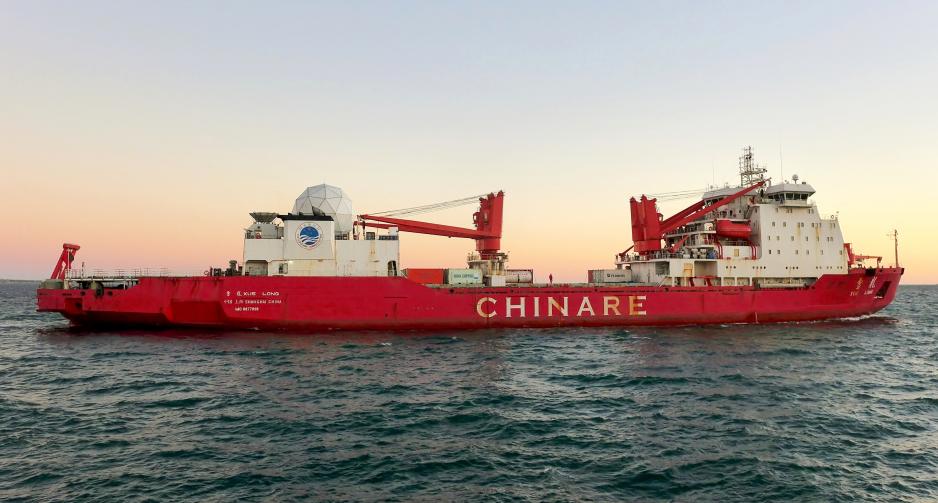Explaining China’s Arctic Interests, the U.S.’ Efforts to Re-Engage, and the Growing Split Between the Two Countries

Chinese icebreaker Xue Long (Courtesy of Bahnfrend under CC BY-SA 4.0)
Earlier this week China announced that it is conducting tests to improve ground- and satellite-based communications in the Arctic, raising concerns about this technology potentially also serving military purposes. The country’s research and economic activity in the region has been closely scrutinized.
In this interview Marc Lanteigne, Associate Professor at the University of Tromsø and expert for the politics and foreign policy of China, sheds light on China’s Arctic activities, the U.S.’ efforts to re-engage in the region, and the increasing disagreement between the U.S. and China in the Arctic.
How do China’s efforts to expand satellite coverage in the region fit within the larger context of its growing Arctic engagement?
The current debate over Chinese interests in expanding satellite coverage of the Arctic starts with the understanding that such systems could and likely will have dual-use capabilities. From an economic viewpoint, ever since 2013, when a Chinese cargo vessel first made an experimental trip through the Northern Sea Route, there has been a great deal of interest both from the Chinese government and relevant industries, (including Cosco Shipping), to expand maritime trade in the Arctic, as further indicated by the September 2014 publication of an official navigation guide by the Chinese Ministry of Transport. In addition to these interests requiring closer Chinese cooperation with Russia, there has also been the perceived need by China to improve communications capabilities in the Arctic. This will aid Chinese and Russian civilian vessels, but the question remains whether this technology could easily be transferable to the military realm, and it is this ambiguity which has prompted other instances of pushback.
The question remains whether this technology could easily be transferable to the military realm.
What role do Chinese Arctic installations, e.g. in Ny-Ålesund or in Kiruna, Sweden play?
In 2017, China floated the idea of a scientific research station in Greenland along similar lines as the installation at Ny-Ålesund on Svalbard, and even though such a base would have been permissible under the terms of a 2016 memorandum of understanding between the Chinese and Greenlandic governments, the plan is gone into abeyance due in no small part to Danish pressure, again over worries about potential military applications. It was ongoing concerns about Beijing developing some sort of tactical beachhead on Greenland which was at least partially responsible for the whole ’U.S. buys Greenland’ debate last month. China has also been in the middle of on-again, off-again plans to build an internet cable between Northeast Asia and the Nordic region via the Siberian Arctic. Finally, China has been seeking to enhance its overall telecommunications capabilities, which was the main rationale of the Kiruna facilities. At present, China is still a relative newcomer to the Arctic, and has had to be sensitive about any activity which may be construed as challenging the current political and security situation in the region, which is why Beijing continues to place much emphasis on scientific diplomacy in the Arctic.
Concerns about Beijing developing some sort of tactical beachhead on Greenland were at least partially responsible for the whole ‘U.S. buys Greenland’ debate.
However, all of this is taking place at a time when military activity in the Arctic is rising, including in the case of extensive activities by Russia and NATO in the Atlantic Arctic and we are back to the question of whether Chinese facilities along the Northern Sea Route and elsewhere in the Arctic can be used for tactical reasons. That is a possibility, especially given growing signs of a policy split between the US and China in Arctic affairs. As with any great power, China is hardly going to ignore the security uses of Arctic-based data, and so Arctic governments are going to have to approach cooperation with Beijing in this area with the understanding of the degree of ‘strategic ambiguity’ involved.
We often read highly simplified media reports about “China taking over the Arctic” and “China looking to exploit Arctic resources.” However, is it not correct that China is pursuing legitimate economic interests or security interests in the Arctic in accordance with, at least so far, international law? So why does its Arctic engagement create so many headlines or official reactions?
Yes, in the Chinese government's White Paper on Arctic Policy published in January of last year, Beijing was direct in its assertions that it had no desire to challenge the political and legal institutions in the region but rather to work with them. At the same time, the paper stressed that non-Arctic states did have the right to engage in scientific and economic activities in accordance with international law. There are several governments in Europe and Asia which do not have Arctic borders but do have active Arctic engagement policies, including Britain, France, Germany, Japan and South Korea, but China, as an emerging great power and the second-largest economy in the world, has been put under much more direct scrutiny, especially by the United States as Sino-American diplomacy as a whole continues to cool. For the past few years, Chinese policy papers have referred to the country as a 'near-Arctic state', which reflects not so much geography, (the distance between China's northernmost point and the Arctic Circle is about 1400 kilometres), but is a response to Beijing's views that China has a distinct political and economic role to play in the future of the Arctic.
China as an emerging great power has been put under much more direct scrutiny
Following up on the policy split between the U.S. and China in Arctic affairs: the U.S. has stepped up its rhetoric vis-à-vis Chinese and Russian activity in the Arctic, during Secretary of State Pompeo’s visit to the Arctic Council in Rovaniemi a few months ago and in the latest version of the DoD Arctic Strategy. This week Vice-President Pence is visiting Iceland where he is expected to discuss security issues related to Chinese and Russian activity in the region. How do you see the current state of the U.S.’s interests in the Arctic?
To phrase it mildly, U.S. diplomacy in the Arctic is in serious trouble. After two years of near-complete neglect of the Arctic by the Trump government, Washington is attempting a policy 'comeback' in the region which can't stop tripping over its own feet. The United States still has yet to ratify the UN Convention on the Law of the Sea (UNCLOS), a stance which negatively affects its ability to address emerging maritime security issues in the Arctic, and more worrying, the current view of the U.S. government that climate change does not exist when so much evidence to the contrary is appearing day after day, seriously damages American credibility in the region. Moreover, both the Pompeo speech in Rovaniemi and various U.S. strategic policy documents published this year suggest that Washington is trying to gently but firmly place Russia and China as the main security threats to the Arctic, while ignoring not only climate change but also the serious developmental challenges the Arctic is facing because of these changed climate conditions. The visit this week to Iceland by U.S. Vice President Pence was another sign of the growing one-dimensional nature of current American Arctic policy. In his remarks, the Vice-President appeared to be more concerned with whether Iceland was seeking to join Beijing's Belt and Road Initiative rather than putting forward U.S. ideas and proposals regarding the future of the Arctic.
Separating economic and security interests in the Arctic is becoming that much more difficult.
The recent imbroglio over whether the United States should 'purchase' Greenland was another step backward for Washington's status in the region. Not only did the whole affair reflect profound U.S. government ignorance of Greenland's legal status, but it suggested that the Trump government was stuck in a neo-colonial mindset which views that Arctic as a blank space where anyone with enough money and pull could claim, buy and sell whatever they wished.
How can the U.S. and its NATO partners address this increasing blurring of economic and strategic interests in the Arctic? Or do they have to accept the “strategic ambiguity” you mentioned earlier?
Both because of the growing accessibility of the Arctic, and its resources, and the fact that the region is becoming an arena for strategic competition between Russia and the West, strategic ambiguity is manifesting itself in many ways. Moscow has argued that the movement of military personnel and materiel to its Arctic lands is necessary to better monitor emerging sea traffic in the Northern Sea Route, but such deployments also place strains on NATO's Arctic strategic assets. China's Huawei is interested in potentially upgrading the very poor-quality internet infrastructure in Northern Canada, but critics are worried about the implications for communications security. Northern regions in Finland and Norway are very excited about the possibility of new transportation links being financed by China, but there are questions about affordability and potential debt. Separating economic and security interests in the Arctic, especially as some governments take a stronger zero-sum approach to the region, is becoming that much more difficult.
The U.S. has stepped up its Arctic rhetoric and aims to commission new icebreakers in the next decade, but has also relinquished e.g. its (Arctic) climate change leadership under the Trump Administration. Is it prepared to "defend" its Arctic interests if the Arctic policy split between the two countries deepens?
The problem here is that we are still waiting to see exactly what American Arctic interests actually are beyond a very narrow military thinking. The Trump government has articulated what it does not want to see in the Arctic, namely a duumvirate of China and Russia dominating regional politics and governance, but the U.S. has yet to put forward any alternative viewpoint. The belated policy of building new icebreakers may be a step in the right direction, but so far the U.S. has been cool towards Arctic cooperation and the benefits of multilateralism in the region. Right now, American Arctic policy appears to be just another extension of unilateralist and protectionist 'America First' thinking, which is very ill-suited to addressing the growing and varied challenges the Arctic is facing.

Marc Lanteigne (Courtesy of Marc Lanteigne)

